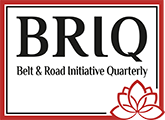EDITORIAL
Towards a New Cooperation Framework in the Eastern Mediterranean:
Moving Beyond Hegemonist Containment
The United States appears to be using the Ukraine crisis, instigated by its own hand, as an opportunity to further its hegemonistic agenda, which has been in decline for far too long. While the stated aim of US policy in the Eastern Mediterranean and the Black Sea is to limit Russia, there are also other factors at play. The US has forged alliances with Israel, Southern Cyprus, and Greece, which are directed at both Russia and Turkey. Additionally, the US views the Mediterranean and Black Sea as a strategic front not only against Russia and Turkey, but also against developing countries such as China and Iran.
The Mediterranean region is one of the most vulnerable areas of the Belt and Road Initiative (BRI), which is set to enter its tenth year in September 2023. The BRI is more than just an economic cooperation project among the countries along its path, as its ten-year history has shown that cooperation based on the principle of non-interference in each other's internal affairs has led to a declining hegemonistic agenda on the part of the US. The Mediterranean, which is a vital strategic area for the BRI's growth into Africa and Europe, provides a unique opportunity for the developing world.
Each of the eastern and southern Mediterranean countries, including Turkey, Syria, Lebanon, Palestine, Jordan, Egypt, Libya, Tunisia, and Algeria, has signed individual partnership agreements under the BRI, with some having extensive bilateral collaborations. Despite differing levels of resistance, these countries are pushing back against the impositions of the Atlantic system in the areas of economy, politics, and security.
Against the destructive policy of exporting "democracy" under Atlantic hegemonism, the BRI offers the possibility of independent and shared development through multilateral alliances with developing countries. International cooperation based on the BRI could help to eliminate Atlantic hegemonism that has caused havoc in the region. The countries in the Mediterranean region coming together to safeguard their national interests would have consequences for the northern Mediterranean as well.
Finally, the realization of shared interests among Turkey, Russia, China, and Iran, as well as the countries along the eastern and southern Mediterranean coasts, could form a stronger unity of forces capable of defeating hegemonic containment. Such unification would exacerbate the centrifugal tendencies between the US and Europe and diminish the impact of Atlantic hegemonism on Europe.
In conclusion, integration into the BRI has the potential to benefit the Mediterranean countries in two ways: it would allow each country to develop according to its own characteristics while promoting international cooperation for the common good, and it could also undermine hegemonist impositions and establish world peace.
FİKRET AKFIRAT
Editor-in-Chief
